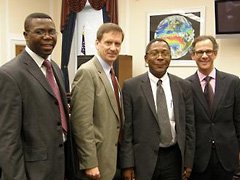Capitol Hill briefing focuses on the role of African scientists in the fight against malaria

From left to right: Dr. Roma Chilengi, Ambassador Mark Green, Professor Tsiri Agbenyega, and Dr. Steve Chapman.
African scientists and researchers are on the front lines of the struggle against malaria, working to defeat a parasite that is both complex and adaptable. This was the message delivered at a congressional briefing on Thursday, September 30 by African researchers Professor Tsiri Agbenyega and Dr. Roma Chilengi. Both are principal investigators working on a Phase 3 clinical trial of the most advanced malaria vaccine candidate, RTS,S. They joined Dr. Steven Chapman, senior vice president and chief technical officer at PSI, to explain the integral role that African researchers have played and will continue to play in the battle against this deadly disease.
Mark Green, former ambassador to Tanzania and current managing director of Malaria No More’s Malaria Policy Center, called for investment in research and development for future vaccines and other health interventions, in current products and interventions, in health systems, and in human capital.
“We must plan ahead to ensure widespread distribution and use of a vaccine, once it is available,” explained Green, who moderated the session. “That requires a major commitment to ensure adequate financing is available and predictable. It also requires investments in the health systems of African countries, and we must continue to build the capacity of African researchers who can conduct trials for vaccines and drugs. A vaccine will be one of many tools for an effective malaria control strategy, so we must also scale up proven interventions.” These include insecticide-treated bed nets, indoor residual spraying, and artimisinin-based combination therapies.
The briefing was sponsored by the PATH Malaria Vaccine Initiative (MVI), Malaria No More, PSI, and the American Society of Tropical Medicine and Hygiene (ASTMH), with support from the Congressional Malaria and Neglected Tropical Diseases Caucus.
Malaria interventions in Africa
Dr. Chapman opened the discussion with an overview of PSI’s ACTwatch program, which provides evidence and recommendations for policymakers on ways to increase availability and decrease the cost of artimisinin-based combination therapies. ACTwatch is active in eight countries, seven of which are located in Africa. African researchers in each of these countries are responsible for implementing the program and for coordinating important country-wide surveys.
Professor Agbenyega, who serves as co-chair of the Clinical Trials Partnership Committee and is former dean of the Medical School at the Kwame Nkrumah University of Science and Technology in Ghana, stressed both the importance of the RTS,S Phase 3 clinical trial and the challenges of conducting such a large-scale study in Africa. The trial, supported by GlaxoSmithKline Biologicals and MVI, is taking place at 11 sites in 7 African countries, and will enroll up to 16,000 infants and children. As a researcher and medical doctor in Ghana, Professor Agbenyega noted that he has seen firsthand the burden of malaria, and especially of severe malaria on young children. He explained that without the support of donors such as the United States, the RTS,S trial would not be where it is today, and that continued support was needed to ensure the vaccine gets to those who need it most.
Dr. Chilengi, head of clinical trials for the KEMRI-Wellcome Trust Collaborative Research Programme in Kenya and chair of clinical groups for ASTMH, noted the need for continued investment in building the capacity of researchers and institutions in Africa.
“The contributions that are made by donors, such as the United States, are not made in vain,” Dr. Chilengi said. “They go a long way.” Projects funded through the U.S. Government, especially through the Centers for Disease Control and Walter Reed, have provided very unique opportunities, he said. “They provide jobs, and above that, they help save lives.”
Dr. Chilengi outlined three reasons for donors to continue supporting capacity building for research and development in Africa. Firstly, he noted that without the facilities or training to conduct clinical research, the risk and burden for developing such products would fall on countries, like the United States, that have the capacity. African nations would bear some of the risk if they had the technology and expertise necessary to conduct this research. Secondly, he noted that if African researchers were able to work toward preventing, rather than fighting disease every day, donor funds could be channeled into other development projects.
“If the above two reasons are not sufficient,” explained Dr. Chilengi, “I would like to think that it should be the desire of all of us to have a world that is free of malaria. That would be a global good.”